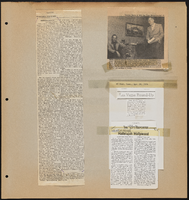Search the Special Collections and Archives Portal
Search Results
"Las Vegas: Snapshots of History" Photograph Collection
Identifier
Abstract
The "Las Vegas: Snapshots of History" Photograph Collection is comprised of photographic prints and slides as well as digital surrogates of photographic prints and ephemera representing architecture and events in Las Vegas, Nevada from approximately 1960 to 2017. Materials were donated by members of the Las Vegas community as part of a community scanning day sponsored by the National Endowment for the Humanities' Common Heritage grant. The majority of the collection documents landmarks in Las Vegas including the Stardust Resort and Casino, The Mint Las Vegas, Fremont Street, and the Desert Inn.
Archival Collection
Dana Su Lee oral history interview
Identifier
Abstract
Oral history interview with Dana Su Lee conducted by Stefani Evans, Vanessa Concepcion, and Cecilia Winchell on February 10, 2021 for Reflections: The Las Vegas Asian American and Pacific Islander Oral History Project.
Dana talks about her childhood growing up in California and her parents who were both born in China. She discusses her educational background and her move to Las Vegas with her husband in 1997. Dana also shares her various community and philanthropic pursuits related to education and the arts.
Subjects discussed include: Greg Lee; otherness; Nevada Women’s Philanthropy (NWP)
Archival Collection
Eric Mendoza oral history interview
Identifier
Abstract
Oral history interview with Eric Mendoza conducted by Holly O'Donnell on November 29, 2021 for Reflections: The Las Vegas Asian American and Pacific Islander Oral History Project.
In this interview, Eric Mendoza shares his family's chain migration history from Manila, Philippines to the United States and his difficult immigration and naturalization process once arriving in America in 1996. He talks about what brought him to live in Las Vegas, Nevada, his education and professional pursuits, what his life is like in the United States compared to that of the Philippines, and the lives of his eight siblings. Eric Mendoza discusses the historical past of the Philippines, the infrastructure in place there, and government corruption. He also speaks to Filipino traditions and festivals, food and customs, his cultural identity, and assimilating to American culture.
Archival Collection
Dr. Javier A. Rodríguez oral history interview
Identifier
Abstract
Oral history interview with Dr. Javier A. Rodríguez conducted by Elsa Lopez and Barbara Tabach on December 19, 2019 for the Latinx Voices of Southern Nevada Oral History Project.
Dr. Javier Rodríguez, Biology Professor at the University of Nevada Las Vegas, talks of his personal and educational history that led him to UNLV. He discusses his migration from Puerto Rico to California where he received his PhD from the University of California Berkley and became a biological museum curator for various animal specimens. He later moved to Las Vegas to teach at UNLV where he has now been for nearly two decades; Dr. Rodríguez shares how UNLV has changed since he first started working here, including the university's increased interest in faculty research to become a Top Tier institution. Subjects discussed include: Puerto Rico; University of California Berkley; University funding; Tier 1 research institutions.
Archival Collection
Loretta Bowman Collection of Clark County Clerk Records
Identifier
Abstract
The Loretta Bowman Collection of Clark County Clerk Records (1912-1997) contain documents collected by Clark County Clerk Loretta Bowman during her time in office. Materials include court proceedings, signed agreements and contracts, appointments to public offices and related correspondence, denials of cases involving battery on police officers, affidavits for birth certificates, and criminal peace bonds. The majority of the materials are oaths of office and the related surety bonds for government officials.
Archival Collection
"Holiday in Japan" dancers joint oral history interview
Identifier
Abstract
Oral history joint interview with the "Holiday in Japan" dancers conducted by Claytee D. White on May 26, 2011 for the Boyer Early Las Vegas Oral History Project. The dancers present for the interview were Sachiko O. Thompson, Minoru Saito, Kazu Hamada, Kyoko Nakamura, Nobuko Suda, and Katsuko Tomoko Billman. The dancers begin by discussing their lives in Japan before coming to the United States in 1960 to perform their "Holiday in Japan" stage show. They describe their reactions to coming to the United States and compare it to life in Japan, as well as their reactions to coming to Las Vegas, Nevada specifically. They discuss performing their show at the New Frontier Hotel and Casino, Desert Inn Hotel and Casino, and Dunes Hotel and Casino. They describe their show, which presented Japanese culture to Western audiences, and the work that went into it. They end the interview by detailing their lives and careers after performances of the show concluded in 1961.
Archival Collection

By-laws of the Nathan Adelson Hospice, November 30, 1978
Date
Archival Collection
Description
The by-laws of the Nathan Adelson Hospice establish the purpose and organization of the program, founded in 1978 in Las Vegas.
Text



